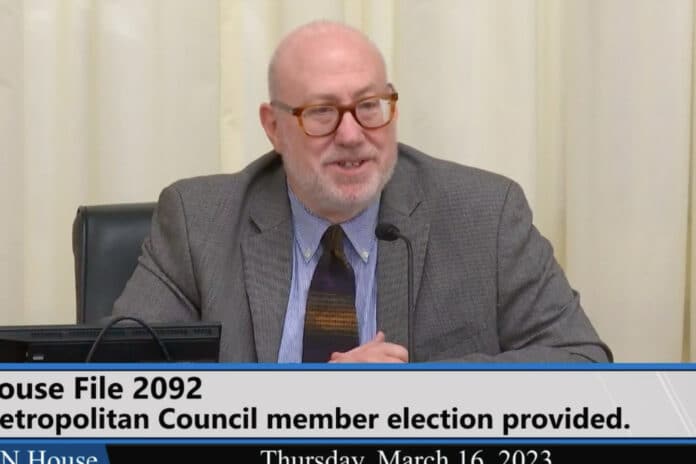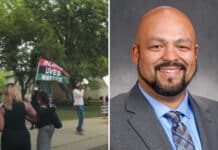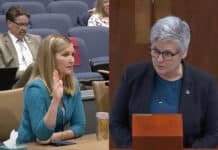
For the better part of the last two decades Rep. Frank Hornstein, a self-admitted progressive DFLer from Minneapolis, has been pushing proposed legislation that would democratize the governor-appointed, 17-seat Metropolitan Council, a regional authority with decision-making power over most regionally-based transit and development issues in the Twin Cities.
On the heels of this week’s latest report from the Office of the Legislative Auditor that concluded the Met Council has been less than transparent about hundreds of millions of dollars in cost overruns and years-long delays for its Southwest light rail project, Hornstein’s bill to restructure the heavily-criticized body to one that is elected by voters is getting a serious look from legislators on both sides of the aisle.
On Thursday the bill, HF2092, received unanimous support from Republicans and Democrats in the House Transportation Committee. The proposed legislation would establish a task force on metropolitan governance with the purpose of studying and making recommendations to the legislature on reform and governance of the Metropolitan Council.
“This is our responsibility as legislators, the ball is in our court,” Hornstein said, echoing the concern many elected officials and members of the public have had over the last several months following the news that the Met Council’s SWLRT project is now more than $700 million over budget and four years behind schedule. “People feel urgency around this.”
Some city and county leaders oppose an elected Met Council
During the hearing several members from affected communities along the SWLRT route complained about the lack of transparency and accountability of the Met Council in hearing their concerns over the project. Many of those testifiers said they prefer an elected Met Council and supported the bill.
The nearly $2.75 billion light rail line that would span 14.5 miles between the Eden Prairie transit station and Target Field in Minneapolis is now planned to be completed in 2027. It would run through several Minneapolis neighborhoods that have filed several lawsuits against the Met Council spanning the last decade over the project.

Legislators in the committee discussed timelines for the taskforce and came to a verbal agreement that the work must be completed before the beginning of the 2024 legislative session.
“It’s just time for us to rework and re-do things, and so I think this [bill offers] an appropriate approach,” said Rep. John Petersburg, R-Mankato.
As of earlier this week, Hornstein’s bill mirrored a Senate bill, which would transform the Met Council into 17 elected seats split up by geography with staggered terms.
Hornstein amended his bill to instead form a taskforce comprised of a broad array of stakeholders, following feedback he received from some municipal and county leaders who are opposed to making it an elected body.
“I think just outright electing a Met Council without really fully understanding the responsibilities and direction, is probably not the way to go,” Petersburg added. “So I think your [amended] approach is much better.”
Also this week, Republican Sen. Mark Koran announced he’ll introduce a bill that would abolish the Met Council altogether, a sentiment that many Republicans have routinely echoed over the last few decades.
‘No taxation without representation’
The idea to restructure the Met Council — i.e. convert it from a body that is appointed by the executive branch to one that is elected by voters in the seven-county metro area — is not new. In fact, former Republican Gov. Tim Pawlenty had once mounted an effort to do just that when he was a member of the House of Representatives in the 1990s, said Myron Orfield, a University of Minnesota law professor and former legislative colleague to Pawlenty. Orfield testified in both the Senate and House in support of moving the Met Council to an elected body.
“There is nothing like [the Met Council] in the United States that has this much broad discretionary authority and taxing power,” said Orfield, who has authored two books about metropolitan regional planning. “There’s nothing even close to it anywhere in the United States.”
“It is the tradition in America for bodies that have broad discretion and authority and taxing power — almost without exception that they be elected,” Orfield added.
And in a spirit of bipartisanship, Hornstein, well-known for being one of the more far-left politicians in the state House, recalled one of his first efforts during the 2003 legislative session to recruit Republican allies for the bill.
One Republican legislator showed interest in the bill and told him she supported the measure because “‘this is about one thing, and it’s very simple — no taxation without representation,’” Hornstein said. “I do think this is one of the main reasons we need to do this.”
Hank Long
Hank Long is a journalism and communications professional whose writing career includes coverage of the Minnesota legislature, city and county governments and the commercial real estate industry. Hank received his undergraduate degree at the University of Minnesota, where he studied journalism, and his law degree at the University of St. Thomas. The Minnesota native lives in the Twin Cities with his wife and four children. His dream is to be around when the Vikings win the Super Bowl.
















